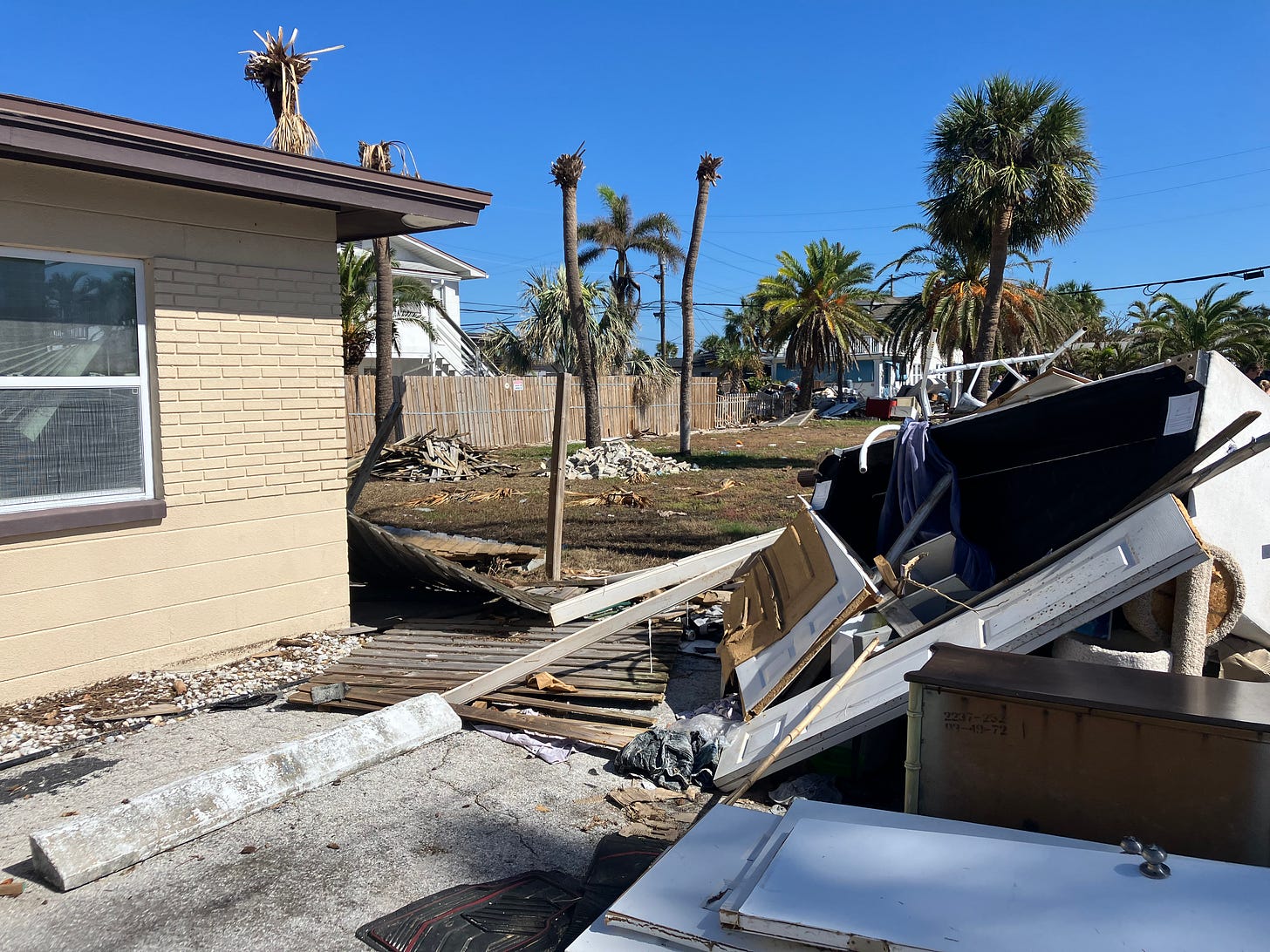There was a piece of aluminum siding, bent in the metal by the wind. A two-feet length of PVC pipe, neatly cut. Ginger ale cans and piles of broken doors. A utility bill. A family Christmas photo. In the back yard, separate piles of cement and wood debris sat on the lawn next to the fronds of now-bald palm trees. Everything was sitting under the Florida sun as residents and rescuers worked to recover and rebuild in the wake of two hurricanes.
I took a quick trip on Sunday to the Tampa Bay area, traveling with President Joe Biden as he surveyed damage from Hurricane Milton. I was part of the press pool, a group of a dozen journalists who are embedded with the president and observe his every move, shouting questions when we can.
Biden took a helicopter tour of affected area, and we could see from our aircraft — a V-22 Osprey — how the storm ripped a gash in the roof of Tropicana Field, where the Rays lose to the Yankees. (I also got to fly on Air Force One, which was really, really, cool.)
The president met with first responders and residents of St. Pete Beach, which is along the Gulf Coast just west of downtown and south of Clearwater. On the motorcade ride in we saw piles of debris and damaged businesses. Someone used a soiled box spring as a big canvass, writing, “Family Owned and Devastated.” I had to laugh at one message, scrawled on the plywood covering of a business on Gulf Avenue: “We don’t want your stapler.” (Click here if you don’t get the joke.)
Biden recounted the story of his home once being struck by lightning, and the fear one has in times of disaster.
“The thing I was most concerned about was not just the home, was all those things — all those pictures I saved of me and my daughter, drawings from when she was little,” he said.
Who knows how many of those things were sitting in those rubble piles, or already lost.
My colleagues from The Wall Street Journal have written several gripping dispatches about the storm and its aftermath. Here are a few:
++ Ginger Adams Otis, Arian Campo-Flores and Joseph Pisani spoke to people who were shocked by the back-to-back punch of hurricanes Helene and Milton. “When we moved to Florida from New York City, I knew we might face natural disasters, like hurricanes and floods,” said Florida resident Johnny Picardo, who was following Milton’s trajectory and thought he was out of harm’s way. “I was not anticipating tornadoes.”
++ In the Carver City neighborhood near the Tampa airport, Allen Denson raked the front yard of his grandmother’s house, where he rode out the storm to keep her company. He told my colleagues that the wind howled fiercely overnight and lights flickered, but the power didn’t go out and the house was unscathed.
“I’m thankful because it could have been worse,” said Denson, 39 years old. “I feel we dodged a bullet.” After many years of close calls with hurricanes, it appeared Tampa was finally in the bull’s-eye, Denson said. But in the end, the storm veered south, sparing the city a much worse storm surge.
“They say it comes our way, but it always veers off,” Denson said. “I don’t know what it is. I feel it’s something about Tampa.”
++ Arian filed this dispatch from Englewood, talking to people who moved there for tropical leaving at an affordable price. For decades, the state has beckoned as something of a magical destination—a sunny escape for retirees and others seeking affordable waterfront living.
But the parade of climate disasters, along with soaring home costs, skyrocketing home-insurance premiums and some of the highest inflation rates in the nation, is undermining that appeal. On Friday night, close to two million people were still without power and the state was just beginning to dig out of a wide swath of damage. Carefree bliss is giving way to constant anxiety.
“It’s too much,” said Cin-dee Cawley, 64 years old, who was spending the day cleaning her sister’s deluged property. Her own home had some gutters ripped off. “It’s like playing Russian roulette. I don’t want to play anymore.”
THE QUESTION: What was the name of the 1992 hurricane that prompted changes to Florida building codes after it devastated the Miami area?
Know the answer? Drop me a line at jimmy.vielkind@gmail.com. Or just write with thoughts, feedback or to say hi.
THE LAST ANSWER: Ross Perot in 1992 won 26% of the vote in Nevada.







